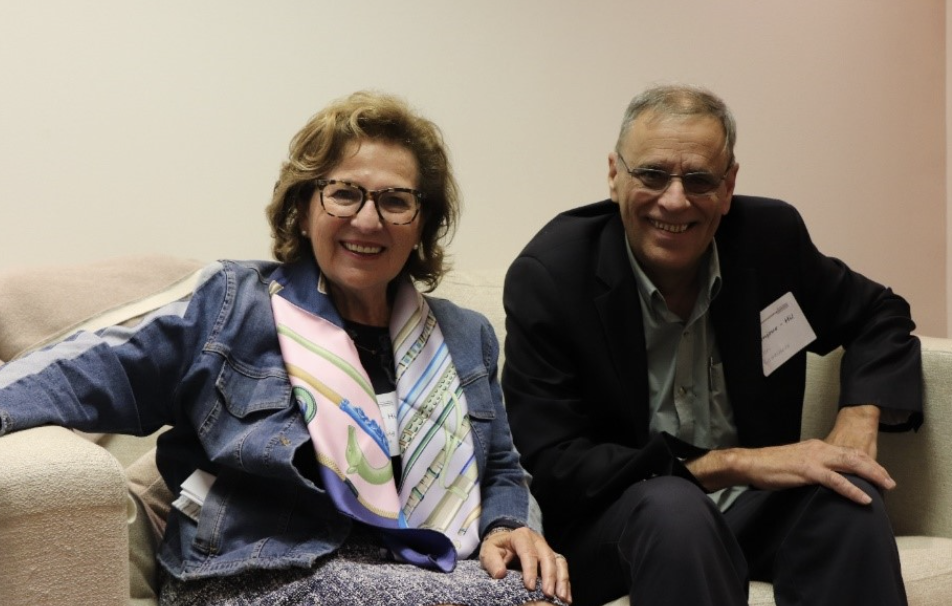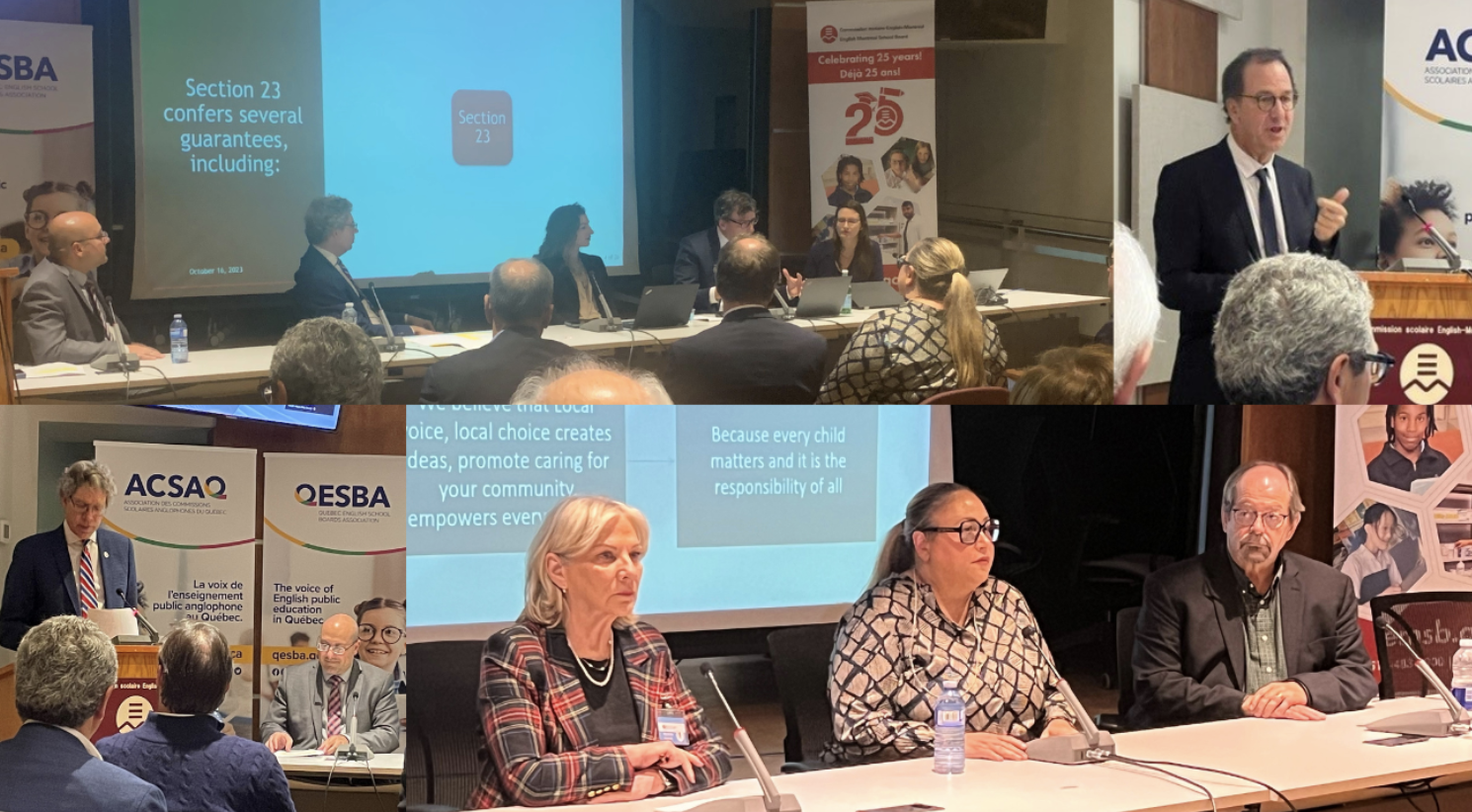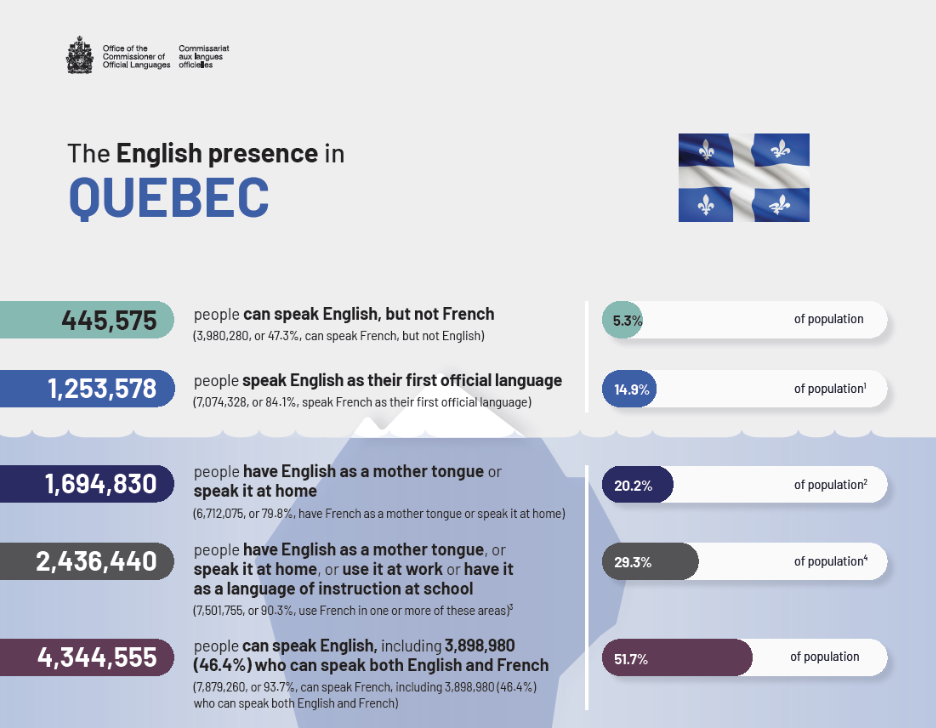
President's Message
TUITION FEE HIKES WILL HARM ENLGISH-SPEAKING COMMUNITY AND CONTRIBUTE TO BRAIN DRAIN
By Eva Ludvig QCGN President
 It has been a busy time since my last column following our Annual General Meeting in June. And as the summer turned to fall, and the House of Commons and National Assembly reconvened, the QCGN is gearing up for a busy political season. As I wrote in a recent commentary in The Montreal Gazette, there are several issues on the political agenda of concern to the English-speaking community. These include legislation on health and social services (Bill 15) and education governance (Bill 23) as well as the looming action plan on the French language to be presented by language minister Jean-François Roberge in mid-November.
It has been a busy time since my last column following our Annual General Meeting in June. And as the summer turned to fall, and the House of Commons and National Assembly reconvened, the QCGN is gearing up for a busy political season. As I wrote in a recent commentary in The Montreal Gazette, there are several issues on the political agenda of concern to the English-speaking community. These include legislation on health and social services (Bill 15) and education governance (Bill 23) as well as the looming action plan on the French language to be presented by language minister Jean-François Roberge in mid-November.
The day our op-ed was published, Roberge foreshadowed the nastiness of the CAQ's action plan when he announced that tuition for undergraduate students from outside Quebec will double starting next year. This plan would disproportionately affect Quebec's English-language universities which attract far more students from outside the province. Higher Education Minister Pascale Déry said proceeds from the tuition hikes will be reinvested in French universities to "rebalance" the network. Premier François Legault also claims the hikes will help stem the decline of the French language in Montreal.
All three English universities — McGill, Concordia, and Bishop's University — have publicly voiced serious concerns about the tuition hike and we fully support them. I also note with satisfaction that a large number of community and business leaders, both French and English, are also fervently opposed to this plan that would have an impact on the economy and all Quebecers. This course of action will prevent Quebec from limiting the brain drain and work against attracting the talent, energy, brains, and perspectives that Quebec needs to build and grow in an increasingly globalized economy.
Last Wednesday the QCGN issued a press release decrying the fact that this move will spur young English-speaking Quebecers to leave the province and stop talented young people in other provinces and beyond from coming here. "Premier Legault says he is trying to preserve and promote the French language in Quebec, and that is a goal we support," comments our Director General Sylvia Martin-Laforge. "But it is now clear this government has concluded that the most effective way to support French is to curtail English and English-language institutions to the greatest extent possible."
In the news release and in media interviews, we also call out the Minister Responsible for Relations with English-speaking Quebecers Eric Girard, asking him what he intends to do on behalf of the community of Quebecers for which he has ministerial responsibility. Our universities are vital institutions of our community, and we expect him to intervene. We must all oppose this malevolent assault on our institutions.
Meet and greet with QCGN members

I was pleased to welcome QCGN members – old and new – to our open house on September 15. The meet and greet was our first event since we welcomed individual members into our fold earlier this year. It proved to be an excellent opportunity for our members, both individuals and representatives of member organizations, to come together, network and share ideas. The breakfast also provided me and my fellow board members with an opportunity to listen to the concerns of our members. The QCGN is thrilled to have individual members on board and is planning a membership drive in the near future to further expand our ranks. I am looking forward to getting to know more about our new members while also strengthening the relationships we have with our current members.
New Board of Directors meets for first discussion

QCGN's new Board of Directors had its first official meeting on Sept. 15 following their election in the late spring and the summer hiatus. The Board consists of myself, President Eva Ludvig, Vice President Katherine Korakakis, Secretary/Treasurer Grant Myers as well as directors Alix Adrien, Eleni Bakopanos, Chad Bean, Jordan Black, Chelsea Craig, Joan Fraser, Maria Kyres, Eric Maldoff, and Peter Starr. (Missing from photo: Matt Aronson, Eric Maldoff, and past president Marlene Jennings). During the meeting, the Board resolved that the QCGN seek leave to intervene before the Quebec Court of Appeal in the Bill 40 case Procureur général du Québec c. Quebec English School Boards Association et al. The QCGN, which intervenes on matters of importance to the English-speaking community at large, will develop its position and arguments in consultation with the Quebec English School Boards Association. The Board also resolved to seek funding for the intervention from the federal Court Challenges Program.
New Ministers and Parliamentary Secretaries
Following a federal cabinet shuffle in late July, the QCGN welcomed Randy Boissonnault, the newly appointed Minister of Official Languages, who is also responsible for of Employment and Workforce Development. We also welcomed the appointment of Anita Anand, the new President of Treasury Board, and Arif Virani, the new Minister of Justice and Attorney General of Canada. Boissonnault and Anand have key leadership roles in the implementation of recent changes to the Official Languages Act (OLA) and the implementation and the federal Action Plan for Official Languages 2023–2028: Protection-Promotion-Collaboration. Meanwhile, Justice Canada continues to make important investments to ensure access to justice for English-speaking Quebecers.
More recently, on Sept. 16, the Prime Minister also appointed Parliamentary Secretaries to assist his new ministers. We look forward to working with Marc G. Serré, who continues his role as Parliamentary Secretary to the Minister of Official Languages, as well Hull-Aylmer MP Greg Fergus at Treasury Board and Etobicoke MP James Maloney at Justice. (Greg Fergus has since become the first Black man elected to the role of Speaker of the House of Commons.)
The new ministers and their parliamentary secretaries will have their plates full setting into motion the new regulations, policies and programs ushered in by C-13 An Act for the Substantive Equality of Canada's Official Languages. The challenges are many, as we continue to underline our fundamental opposition to parts of the Act that refer to Quebec's Charter of the French Language. Moreover, we as a community are eager to equitably benefit from the Action Plan for Official Languages 2023–2028: Protection-Promotion-Collaboration. There is much work to do, and we look forward to meeting with our new ministers and their parliamentary secretaries to provide them with any assistance they require in understand the needs and priorities of English-speaking Quebecers and the organizations that serve them.
Where's Anthony?
I must note that when the Prime Minister unveiled his new team of Parliamentary Secretaries, we were unhappy to see that Mount Royal MP Anthony Housefather's name was no longer among them. Anthony acted honourably on behalf of English-speaking constituents in speaking out against references to Quebec's Charter of the French Language in Canada's Official Languages Act. Like the QCGN and many English-speaking Quebecers, he strenuously objected to the provincial law which invokes the Constitution's notwithstanding clause to restrict the rights of English-speaking Quebecers. Anthony's courageous and principled stand on behalf of the English- speaking community of Quebec is worthy of praise and we were deeply disappointed.
Bill 40 decision a ray of hope
A ray of hope for our community in August when Superior Court Justice Sylvain Lussier declared sections of Bill 40, abolishing English school boards, were invalid. The landmark decision was a significant victory not only for the English-speaking community of Quebec, but for official language minority communities across Canada. We were, however, disappointed that the Government of Quebec has decided to appeal a Superior Court decision in early August. In filing the appeal, the Attorney General of Quebec puts forward that that Justice Lussier" confused the purpose of section 23 of the Canadian Charter with the means chosen by the constituent to achieve that purpose, namely the right to minority language education and not the right to a system of political governance." The appeal also notes that the ruling disregarded the teachings of the highest court in the land that "the persons who will exercise the power of management and control described above are Section 23 parents or persons designated by such parents as their representatives. (Read update on battle against Bill 40 below.)
QCGN congratulates departing QESBA President Dan Lamoureux
 On behalf of our members and the community, the QCGN would like to thank Dan Lamoureux who has completed his term as President of the Quebec English School Board Association (QESBA). A former president of the QCGN, Dan is stepping down after five years of dedicated service to the QESBA. During his reign, Dan was the public face of the battle against Bill 40 – here and in the rest of Canada. Dan remains chairman of the Riverside School Board until the next school board elections. We thank Dan for yeoman service on behalf of Quebec's English-speaking community and wish him the very best in his future endeavours. Perhaps he will get a chance to make good use of the golf clubs he received as a parting gift from the QCGN. The new president of the QESBA is Joe Ortona, chair of the English Montreal School Board. We wish him well and offer our continued support on issues that affect our schools and our community.
On behalf of our members and the community, the QCGN would like to thank Dan Lamoureux who has completed his term as President of the Quebec English School Board Association (QESBA). A former president of the QCGN, Dan is stepping down after five years of dedicated service to the QESBA. During his reign, Dan was the public face of the battle against Bill 40 – here and in the rest of Canada. Dan remains chairman of the Riverside School Board until the next school board elections. We thank Dan for yeoman service on behalf of Quebec's English-speaking community and wish him the very best in his future endeavours. Perhaps he will get a chance to make good use of the golf clubs he received as a parting gift from the QCGN. The new president of the QESBA is Joe Ortona, chair of the English Montreal School Board. We wish him well and offer our continued support on issues that affect our schools and our community.
COMMUNITY RAMPS UP BATTLE AGAINST BILL 40

By Rita Legault QCGN Director of Communications
The Quebec English School Board Association along with education and community stakeholders are ramping up their preparations for the legal battle against Bill 40.
Dozens of educational and community leaders from across the province attended a hybrid meeting last Monday hosted by the English Montreal School Board (EMSB). All spoke out against Bill 40 and other government legislation that impacts the rights of Quebec's English-speaking minority community to control and manage its school system.
"All of us want our children to be comfortable in French. We are committed to helping our graduates have the linguistic skills to live and work in French," commented QESBA President elect and EMSB chair Joe Ortona (sitting bottom left). "We maintain, however, that the protection and promotion of French should not be done by setting aside the fundamental rights of Quebecers, nor by infringing on the rights of the English-speaking community of Quebec."
"While the QESBA is proud to be standing up for the rights of our community, all of us in the education field are frustrated that we are spending too much time worrying about what is going on in the court room rather than the classroom," he said. "But the court challenges to Bills 21, 96 and of course Bill 40 are critical. We have to defend our community and our institutions."
Russell Copeman (standing bottom left), QESBA's Executive Director and the Power Law legal team of Mark Power, Audrey Mayrand and Perri Ravon (top right), presented an overview of the case against Bill 40 as well as briefing on Superior Court Justice Sylvain Lussier's ruling which declared Bill 40 was unconstitutional because it takes away the right of Quebec's English-speaking minority to control and manage its own schools.
Also on hand was Alain Fortier (top right), the former president of the now defunct Fédération des commissions scolaires du Québec who discussed the experience on the French side where school boards have been abolished. Fortier declared that local boards are important because problems are quite different from one region to another. That is why community representatives must sit with educational leaders and even members of government to govern schools according to local needs and priorities.
"There is no power for change greater than a community discovering what it cares about," commented QCGN Director General Sylvia Martin-Laforge, who sat on a panel (bottom left) with Geoffrey Kelley, past chair of APPELE-Québec, a coalition of organizations representing the rights of English-speaking communities; and Katherine Korakakis, president of the English Parents' Committee Association (EPCA).
Panelists urged the community to get involved and contribute to the ongoing battle against Bill 40. Donations supporting our school boards can be made online through the Fondation Notre Home Foundation. Information on how to donate can be found on the QESBA website. Donors will receive a receipt for income tax purposes.
"There is a lot at stake for our children and the future vitality or our communities and I encourage everyone to remain informed and to get involved," said Martin-Laforge.
OUR COMMUNITY MUST BE CONSULTED ON BILATERAL AGREEMENTS
By Sylvia Martin-Laforge and Russell Copeman
There is a proposal in the air to create a single bilateral agreement between Ottawa and Quebec City which includes both Education and Provincial Services in the minority language.
This is new, and we are perplexed by the political and/or administrative motivation for merging the many millions of dollars already going to education with the much smaller amount devoted to services in English.
There are several reasons to be concerned.
From the outset, funds under services agreements were only invested in the Health and Justice sectors. We have argued for nearly 20 years that this needs to be expanded to sectors such as Seniors and Youth, as well as Arts, Culture and Heritage. So, while we welcome any increase in the envelope and encourage governments to consider the needs of additional sectors and consult directly with them, there's a piece missing here: We need to be at the table when the governments are cutting up the cash.
The matter of minority-language education is a case in point.
In 2020-2021, the last year for which we have statistics, Ottawa handed Quebec $65 million for this purpose, but off the top, about 60 per cent of that money – nearly $40 million – went straight into Quebec's general revenue funds, to be used for whatever purpose the province sees fit.
Another 20 per cent – about $21 million – was directed to the province's Ministry of Education, where that portion of the funding is further divided. Programs for English second-language instruction in French-language school service centres got $8 million, and the remaining $13 million – or 20 per cent of the original lump sum – went to support the minority-language school network and French second-language training.
In the end, only $1.5 million is allocated to the Entente Canada-Québec Liaison Committee which includes representatives of the Ministry of Education, Directors General of English school boards and the Quebec English School Boards Association (QESBA), for projects in the English education network.
The remaining nine per cent of the original envelope – nearly $6 million – was directed to post-secondary education.
We are concerned about the lack of accountability in this process when it comes to education.
How does Quebec spend the $38.3 million taken off the top for general revenues?
Quebec rejects accountability requirements
Quebec is not forthcoming when it comes to accountability, and has been trying, through Bills 40 and 23, to further curtail community input in education matters. When it came to the last round of the services agreement, Quebec refused to agree to the accountability requirements Ottawa demanded and the agreement was never signed.
Meanwhile, Ottawa has itself been lax in demanding more accountability and enforcing guaranteed community rights regarding the control and management of minority-language education.
Both levels of government are not, we contend, living up to their responsibilities to involve community groups in meaningful consultations concerning minority-language education and services, and in being truly and clearly accountable for millions of tax dollars being expended.
This is particularly pertinent given that the current federal Action Plan on official languages indicates a shift toward providing more official-language funding via transfers to provincial governments. We submit that funds funneled through any intergovernmental co-operation agreement with Quebec must be invested in services to English-speaking Quebecers, and not just to government bodies.
Further, it is important to ensure the oversight of federal-provincial bilateral agreements that affect official language minorities is not handed to provincial or territorial governments. This is especially important in the Quebec context, where we have seen it is possible for federal and provincial objectives to be in competition, or even opposition, to one another.
While we appreciate the provincial Secretariat's initiative to consult organizations representing English-speaking Quebecers, we are concerned about the process going forward, under which the terms of any proposed agreement on minority-language education would be negotiated only between the two levels of government – with little direct consultation with the community.
That, judging by an earlier Supreme Court of Canada decision (the Mahé decision of 1990), would appear to be a violation of constitutionally guaranteed rights for community management and control of minority-language education.
The same framework should apply to the smaller services agreement.
The Quebec Community Groups Network (QCGN) and the Quebec English School Boards Association (QESBA) have stressed that any intergovernmental agreement in the area of official languages must align itself with our community's concerns and priorities. These are included in the 2022-2027 Community Development Plan for English-speaking Quebec, which reiterates that our community must be an equal partner at the table where major decisions are made on policy, programming, and funding, so we can speak to our priorities as an equal partner.
We must also guard against one level of government assuming it has the mandate to speak on our behalf, lest other political considerations intervene.
Nothing about us without us.
Sylvia Martin-Laforge is Director General of the Quebec Community Groups Network
Russell Copeman is Executive Director of the Quebec English School Boards Association
Read the press release by QESBA and the English Parents' Committee Association (EPCA) calling for transparency in Canada-Quebec entente distribution.
For more on Intergovernmental agreements, read QCGN's Policy Matters blog post that explains Intergovernmental Agreements to support minority language communities.
THE VAST MAJORITY OF QUEBECERS CAN SPEAK FRENCH AND MOST DO

Figures released last week by the Office of the Commissioner of Official Languages (OCOL) on the presence of English in Quebec go a long way to debunking myths about English-speaking Quebecers and their ability to speak French.
Almost all Quebecers (93.7%) can speak French, and the vast majority of them (90.3%) use French in an important sphere of their lives – at work, school or elsewhere.
"Some politicians and many commentators in the French media cite census data on the percentage of Quebecers who primarily speak the language at home to indicate a catastrophic decline in French – and in the rest of the country," commented QCGN Director General Sylvia Martin-Laforge.
Using select data from the census, the number of Quebecers who speak French at home decreased from 79% to 77.5% between 2016 and 2021. "But that does not count the number of Quebecers who speak French every day."
"What is that famous quote attributed to Mark Twain?: 'There are three kinds of lies: Lies, Damned Lies, and Statistics,'" Martin-Laforge said, noting that fear-mongering zealous protectors of the French language use those numbers to paint the most sombre portrait of the situation.
"The QCGN believes that the preservation and promotion of French in Canada requires vigilance and attention, but the situation is not as dire as some would have you believe," she said. "And the decline in the number of Quebecers speaking French at home has more to do with the low birth rate of French-speaking Quebecers."
OCOL's fact sheet on the presence of English in Quebec reveals that one in five Quebecers (20.2%) have English as a mother tongue or speak it at home. Some 52 per cent of Quebecers can speak English and almost one third (29%) use it at home, at work or at school. Only five per cent of Quebecers can speak English, but not French.
The fact sheet on Canada shows that almost 30 per cent of Canadians (29%), or about 10.7 million, can speak French. More than 8 million (8,066,633) report French as their first official language spoken and still understood. Some 9.4 million Canadians, about a quarter of the population, use French at home, at work or at school.
The full data package covers Canada's official language minority communities in each province and territory. Based on the latest data from the 2021 Census, these snapshots illustrate the status of official languages across the country in a variety of areas. Each snapshot features data on the use of official languages and includes data and information on official language minority communities in terms of immigration, education, community celebrations, media resources and history.
REGIONAL ASSOCIATION OF WEST QUEBECERS ELECTS NEW BOARD
By Riley Dalys Fine Director of Community Engagement and Strategic Alliances
The annual general meeting of the Regional Association of West Quebecers (RAWQ) on September 27 marked the last for outgoing RAWQ President Arthur Ayers who has served for nine years on their board of directors, including seven as president.
Newly elected to the board of directors were Chad Bean, a member of the QCGN Board, and Susan Larocque. Board members David Gillespie, Benjamin Woodman, Cathy Dubreuil, Nikki Buechler, and Judith O'Rourke were elected for the second year of two-year terms. Also renewed at the AGM were Chris Judd, Alexander Hays, and Angela Britten.
At a subsequent first meeting of the executive committee on October 3, David Gillespie was appointed as President and Judith O'Rourke vice-president.
The QCGN joins RAWQ in thanking Arthur for his service and dedication and wish him the very best of luck for whatever challenges awaits him in the future.
The QCGN is proud to support its member organizations including RAWQ, formerly the Outaouais Alliance, one of our founding members. For more than 40 years, RAWQ has dedicated itself to serving and supporting the minority language community in the Outaouais. Much of this important history was discussed during a keynote address by local community leader (and former QCGN vice-chair) Rick Henderson.
During his keynote address, Henderson spoke to the importance of preserving local history and the part played by groups like RAWQ in ensuring that the English-speaking community is represented in the discussions that shape this history. "RAWQ's job in this process is not to be everywhere and do everything – its role is to mobilize the forces that work together to strengthen the voice of the community," Henderson said.
QCGN could not agree more, and we believe that this approach to collaboration can be shared with other partners and stakeholders so that we can all work together to achieve what we cannot accomplish on our own. We congratulate RAWQ and community leaders across Quebec on their hard work to make English-speaking Quebec more vital.
![]()
LEARN UNVEILS NEW WEBSITE

Explore Learns' new website to learn more about the organizations resources and educational services. Introducing LEARN! We're an innovative driving force for the English-speaking educational community of Quebec!
A network of educational resources for students, parents, educators, and community members!
Our mission? To serve the lifelong learning needs of our vibrant community and boost student success!
Head over to our website to discover more about what we do and browse our FREE resources!
YES HOSTS NIGHT OF ENTERTAINMENT, ELEGANCE AND IMPACT FOR A CAUSE!

Submitted by YES Employment + Entrepreneurship
On October 19, YES Employment + Entrepreneurship hosted an unforgettable evening of entertainment, elegance, and impact at the stunning Cabaret Lion d'Or for our annual Tune In To YES fundraiser. The event was set against the glamorous backdrop of Casino Royale: Betting on Better Futures!
Guests were treated to an immersive experience, enjoying popular casino games like Blackjack, Roulette, and Poker. The atmosphere was further enriched by soulful live piano music, live portraits capturing special moments, a delectable array of appetizers and drinks, comedy from Joey Elias and an epic silent auction. It was a perfect blend of good times and great people, all united by a shared desire to help build a stronger community.
A Chance to Make a Difference
"We're thrilled to share that we've already raised an incredible $50,000! But the night's impact doesn't end there," said Aki Tchitakov, executive director of YES. "We're on a mission to raise $60,000 to support our community's job seekers, artists, entrepreneurs, and small business owners."
The online silent auction is open until October 31, giving you a chance to be a part of this incredible movement. With more than 70 items up for grabs, there's something for everyone!
Now is the perfect moment to demonstrate support for YES and the incredible work they do for the English-speaking community. Your support has the power to change lives and shape better futures for job seekers, artists, entrepreneurs, and small business owners in our community.
Visit Tune in to YES'17 and place your bids. Every dollar counts towards the goal!
Thank you for reading our regular newsletter. For up-to-date news about the Quebec Community Groups Network you can visit our website at www.qcgn.ca or follow us on Facebook, Twitter and/or Instagram.
 |